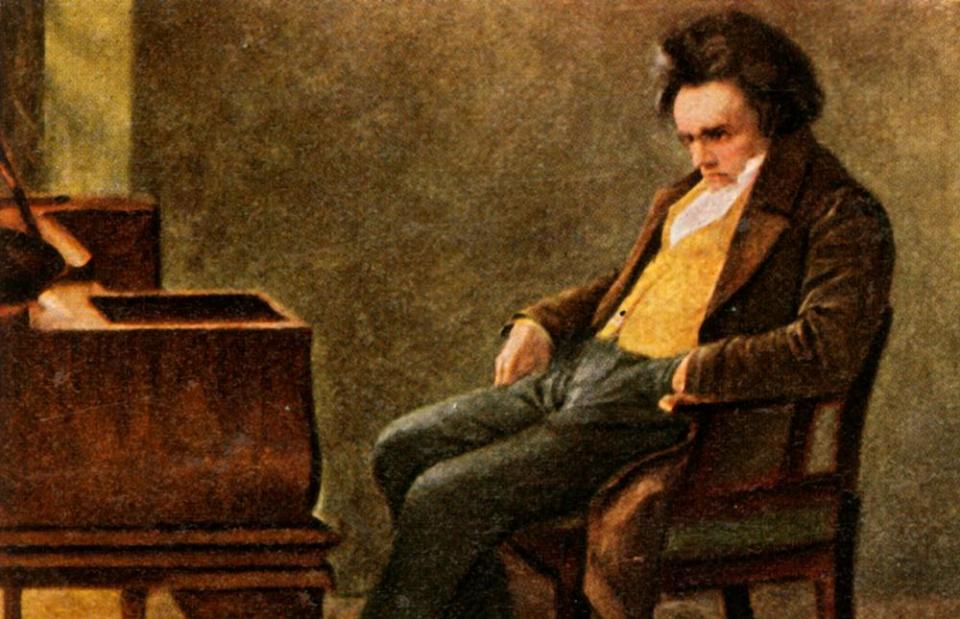Beethoven: A Life in Nine Pieces by Laura Tunbridge – review

A book about the most famous composer in the western canon, a “dead white male” at that, isn’t an obvious place to look for insights into our current plight. Yet from the opening paragraph, Laura Tunbridge’s short, illuminating study of Beethoven (1770-1827), published to coincide with the 250th anniversary of his birth, casts a loose net across the centuries and deftly gathers in the connections. Not that she could have known quite how pertinent her starting point would be. Beethoven: A Life in Nine Pieces opens with a prolonged campaign, begun soon after his death and lasting nearly two decades, for a monument to the composer to be built in his birth city, Bonn. If our current preoccupation is more about knocking down than erecting, this statuary episode reminds us of our compulsion to honour, in lifelike replica or exhaustive biography, those we celebrate.
How can anyone say anything new about a composer who ranks alongside Shakespeare and Dante? Beethoven biographies have poured forth steadily since his death: from Johann Aloys Schlosser’s in 1827, to key works by Alexander Wheelock Thayer (three volumes, published 1866-79), Maynard Solomon and, most recently, and massively, Jan Swafford. If you can’t add musicological novelty, fiction could be the answer. Paul Griffiths (former music critic of the New Yorker) and Jessica Duchen (the Independent critic, and a blogger) have produced novels to coincide with the inevitably thwarted anniversary: Griffiths’s Mr Beethoven (Unbound), with a formidable display of fantasy scholarship, depicts him living in and travelling to America. Duchen’s Immortal (Unbound) explores the enduring mystery of Beethoven’s unidentified “immortal beloved”, if she existed at all.
Tunbridge’s pithy A Life in Nine Pieces is different and welcome: a biography presented through the focus of nine different compositions, each casting light on aspects of Beethoven’s life, character and, given equal and readily comprehensible attention, the music. Her choices span early to late repertoire: from one of his first successes in Vienna, the Septet, to the Grosse Fuge, via Symphony No 3 “Eroica”, the opera Fidelio, and the Missa Solemnis. Tunbridge, an Oxford professor here publishing her first non-academic book, writes clearly, explaining technical terms on the go and with ease: never an easy combination.
Tunbridge challenges the presumption that Beethoven was curmudgeonly, friendless, loveless. Eccentric, yes
More interested in reality than myth – with Beethoven, there’s rather too much of it about – she is particularly sharp-eyed, and refreshing, on the practicalities that shape any artist’s life. How to make a living is a priority. “Reference is made throughout this book to the sums Beethoven earned,” reads the first introductory note. “He was strapped for cash,” she observes baldly, in those or similar words, more than once. How to find a venue, how to get a score published, how many rehearsals can be squeezed in (usually only one, leading to some disastrous premieres), how much tickets should cost, how to wheedle rich sponsors into donating, how to deal with the uncomfortable business of self-promotion: all make the difference between food on the table or hunger, performance or silence. Ask any composer working today. The issues have not changed.
Beethoven lived in some 60 different apartments in Vienna, at times maintaining more than one at once. From within the walls of these various stuffy, messy, less than hygienic dwellings, the world variously circled by or pressed in. Complaints from the neighbours about noise, musical or verbal – he was famous for having explosive arguments with his servants – may in part explain his peripatetic habit. At times the intrusion came from the political situation. He grumbled that the Napoleonic invasion of Vienna, with its “drums, cannons and human misery”, had put a stop to his singing parties with friends. Since at least one of these gatherings involved performing Handel’s oratorio Messiah – perhaps in Mozart’s version? – you can see why he objected. Public and political, private and domestic, are held deftly in balance.
In 288 pages, Tunbridge gives us detail enough to create a rounded portrait. She challenges, by example rather than theory, the presumption that Beethoven was curmudgeonly, friendless, loveless. Eccentric, yes, and with a canny knack at getting the best deals for his work, but a sympathetic figure too, frustrated by his ever-growing deafness. Her sensitive handling of Beethoven’s ongoing legal battle for custody of his nephew, Karl, and the pleas of Karl’s distressed mother for access, raises many questions. What generosity or need in Beethoven made him want to adopt the boy in the first place? What lack of humanity put him at war with an evidently loving, if low-born, mother? If these emotional trials caused some creative hiatus around that time, we should hardly be surprised. Yet out of this chaos he would write one of his most majestic and complex works, the piano sonata Op 106, “Hammerklavier” (1817-18).
Related: Beethoven: where to start with his music
Genius is too often treated as a rarefied commodity. Tunbridge places it, robustly and unflinchingly, at the centre of a hard-working life. She makes us marvel at Beethoven all the more. Her book closes in the summer of 2019, back in Bonn with an art installation called Ode to Joy – a reference to the famous last movement of his Ninth Symphony – in which 700 waist-high, coloured statues of Beethoven were installed in one of the main squares. What a field day for iconoclasts, should they find fault in this grandly humanitarian and all too human hero.
• Beethoven: A Life in Nine Pieces by Laura Tunbridge is published by Viking (£16.99). To order a copy go to guardianbookshop.com. Free UK p&p over £15

 Yahoo Sports
Yahoo Sports 